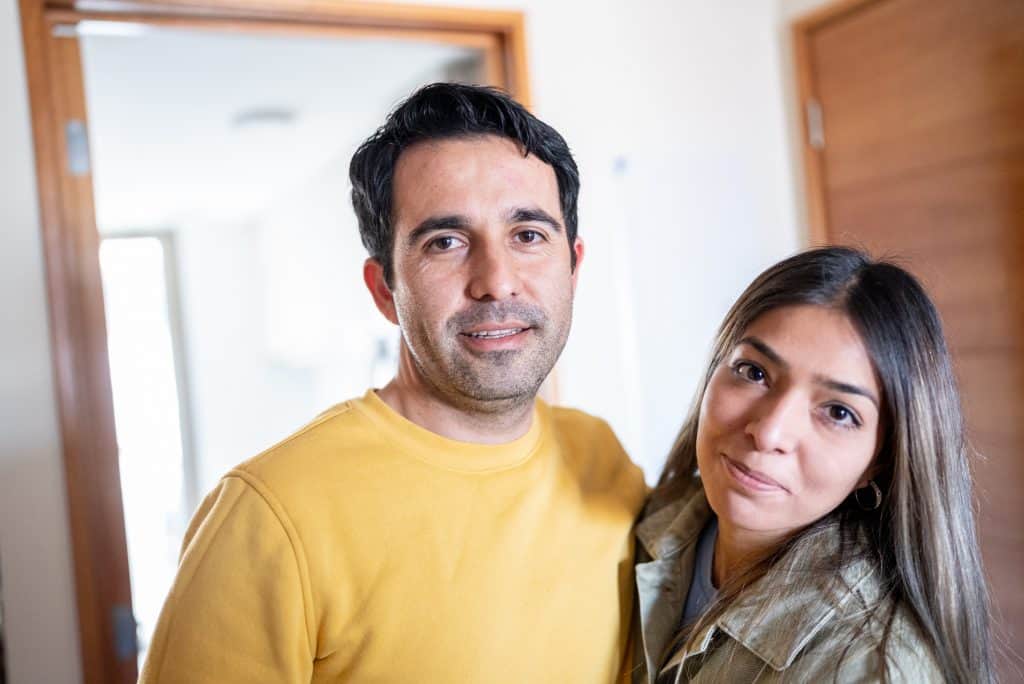George and Linda were 18 months into recovery following Linda’s discovery of George’s sex addiction. Yet things didn’t seem much better between them. “I don’t get it,” George lamented. “I’ve gone to groups. I’ve been through counseling. I’m not looking at porn anymore. What else do I have to do? Why can’t we move on from this?”
If you’re a man trying to rebuild your relationship after betrayal, you may have asked this same question. As a betrayal trauma recovery coach, I find there are five characteristics of men who help their wives heal. But before I list them, I want to correct some common myths.
Myth #1–We (or she) can get over this and move on.
There is no “getting over this.” That’s not to say that your relationship won’t heal, nor that you can’t be truly happy together. On the contrary, couples who do the hard work of rebuilding following betrayal often say that their relationship is better than ever. But rather than getting over the past, they recognize it as part of the fabric of their lives–no longer the main event, but an important one that set them on the path toward creating the life they now have.
Myth #2–She should work her recovery, and let me work mine.
Please don’t ever tell your wife to “stay on her side of the street.” This is, at the very least, annoying, and as a practice, extremely damaging, especially considering that what happened on “your side of the street” brought you to this point and seriously harmed your wife/family. If the relationship is to survive, you must include her in your program, being accountable to her and communicating about your recovery activities.
Myth #3–Each spouse is equally at fault for the disintegration of the marriage.
Sorry guys, but the onus of responsibility to repair the damage is on the betrayer. I know your wife is not perfect. It is the responsibility of the betrayer to rebuild trust and to repair the damage the betrayal has caused. Only then can other issues be addressed. Many couples find that other issues weren’t issues at all when the betrayer rebuilds trust through changing his behavior.
Here are five characteristics I observe in men who help their wives heal—giving their relationship the best chance at surviving and thriving:
Understand Your Wife’s Trauma
Educate yourself about what your wife is experiencing. Once you understand the nature of betrayal trauma, and the impact betrayal has had on your wife, you will be better able to answer your own question, “Why can’t we move past this?”
Unfortunately, trauma can take years to heal, and the scars never completely go away. Years down the road your wife may be triggered, and her physical and emotional response will feel as if she’s right back in that moment of discovery.
Related: Your Wife Has Triggers Too
Even if you’re strong in your recovery, her trauma is still the result of what you once brought into your relationship. This doesn’t mean you need to beat yourself up or live in guilt, but it is an opportunity to help her heal. Recognize that this is how trauma works. Know that she wishes she could get past it just as much as you do, probably even more. Understand she’s in pain, acknowledge that, and ask her what she needs from you. Then, do your best to provide it.
Humility
Now is the time to set pride aside. Honestly, your wife doesn’t want to be asked to celebrate or cheer you on because you’ve been 90 days sober from porn. This is a great accomplishment for you, and you can and should feel good about your progress. But save your need for validation for your support group.
Your wife, with time, will one day appreciate the hard work you’ve done and recognize the things you’ve overcome. But remember, this process was never supposed to be part of your relationship with her. You introduced this painful journey, and until she is sure that you are safe for her, she may not be able to muster joy for you, as she struggles to find it for herself. Put off pride until the two of you can celebrate together the healing of your relationship.
What does humility look like exactly? It means responding to her needs patiently, repeatedly, and consistently. It means answering her questions non-defensively. It means recognizing that her anger and sadness are valid and giving her room to express her feelings. It means owning that you are the one who stepped outside the boundaries of marriage and saying you’re sorry. As often as necessary.
Related: An Open Letter to Wives of Porn Addicts
Complete Transparency
What is transparency? I’ve heard it referred to as “rigorous honesty.” It is living a life of zero deception. It means the life you’re living is the life your wife knows about. It’s recognizing that there should be no secrets in any marriage, much less in one that’s healing from betrayal. Omitting information, deciding for yourself what your wife needs to know, sugarcoating the truth, and minimizing your behaviors are examples of deception.
One of your wife’s toughest challenges right now is rebuilding trust, not only in you, but in her own intuition. Don’t undermine her efforts to trust herself again. It might help you to understand that complete transparency is the foundation for real intimacy. To know and be known. And isn’t that what you’re fighting for?
Related: 3 Reasons Deception Is More Destructive than Porn to Your Wife
A Radical Commitment To Rebuilding Trust
What that looks like for each person is different, but if addiction is present, it should include counseling by qualified professionals, recovery groups, and accountability to a “band of brothers.” A “circle of five” that you can text typically guarantees at least one person will get back in touch when you need it. Seeing that you’re serious about your own recovery adds to your wife’s feelings of safety in the relationship. Other radical changes that you might choose to make include:
- Leaving a job to cut ties with an affair partner
- Putting accountability software on your computers
- Deleting email accounts and/or getting a new one
- Deleting social media accounts
- Initiating daily check-ins with your spouse
- Supporting your wife in her own healing if she wishes to join a support group
- Offering to provide your wife with full therapeutic disclosure and a therapeutic polygraph
When your wife begins to see that you’re willing to put aside your comfort, time, and convenience for the sake of your recovery and your relationship, she can often start to let go of fear and begin to heal herself.
Grit
The effects of trauma lingers. As stated earlier, betrayal carries with it lifelong bruises. Those bruises get bumped. And they hurt. Helping your wife heal means being there for her over and over again. The good news is that as she heals, the triggers come less frequently over time. And this new way of responding to your wife becomes the new you. Win-win! Because it’s the way healthy couples relate. When we hurt, we help each other.
Another reason you need grit is that trust takes time to rebuild. Your wife isn’t going to trust your honesty in the beginning. And she shouldn’t. The truth that you now tell sounds exactly like the lies that protected your secrets. For her to trust you again, she’s going to need to see that this is lasting change.
Recovery is hard work. Repairing the damage caused by betrayal is even harder. On days when that reality feels discouraging, try to remember that there will be a reward in this for both of you. All the characteristics that help your wife heal are necessary for your recovery too. The most important goal is mental, emotional, and spiritual health. Relational healing is part of that. The message I hear time and time again from wives in relationships that survive and thrive is this: “It was ugly in the beginning, but we eventually came together as a team, and my husband helped me heal.”








I really appreciated this article. As one who was bound to my sexual sins, while in ministry, I have been astounded by the grace and forgiveness my wife has demonstrated during these past two years of recovery. Two thoughts:
1) While I’m open about my recovery activities, I’m always hesitant to share about discussions that might “trigger” certain emotions in her. Do we still strive for complete transparency, even if that means triggering these emotions in my wife?
2) I was encouraged about the topic of “Humility,” especially in relation to my own milestones in recovery. I would wonder why she wouldn’t have the same level of joy when I brought home my 1-year coin or gave testimony on my 2-year anniversary of recovery on social media. “This process was never supposed to be part of [my] relationship with her.” Very true.
Thankful for the work of redemption God is doing in our lives and marriage, and recognizing the lifelong process of being restored back together. Thanks, CovenantEyes, for being a part of that process!
I think the problem with the coin is, what woman wants to be married to a man who has to go to meetings to stay faithful to her? It is demeaning to her soul and self-esteem. It is not a marriage in any sense of the word. If she thought she was the love of your life and you spent hours looking at other unclothed women, why should she feel happy that you made it a year fighting off the urge to not cheat on her? It is hard to see your spouse going to meetings every day to try to be faithful. To her it is just more time away from what should have been your life together.
Yes, there’s SO MUCH MORE to true recovery than white-knuckling it through “not looking at porn.” It’s like basing a marriage on the fact that I haven’t eated french fries in a year. When you only avoid certain behavior (even though it’s harmful behavior that you need to avoid!), you’re missing out on the emotional trust of the relationship. Here’s an article on behavioral and emotional trust, citing research from marriage expert John Gottman.
I appreciate your article.
My wife and I have been married for 27 years. I came into the marriage with the chains of bondage to pornography hidden deep in my soul.
I was too ashamed to open up that part of my life. Pornography is the drug I have been addicted for far too long. Pornography is the drug that fed my root cause – LUST. Lust is the cancer of my soul that has killed relationship with God, My wife, my family, church, coworkers and professionally.
I have repented to God for repeatedly betraying and traumatizing my wife. I claim the blood of Christ to cover my sin of lust and The power of His resurrection to keep me from ever going back to the sinful life I once lived.
I am grateful and praise God that my wife chose to work with me instead of leaving the marriage. For all I have put her through, I don’t deserve her.
I am also thankful for a good core support group I found in sexaholic anonymous. The steps I have worked bring me each day closer to God and His power is keeping me sober from acting out. Instead of reaching for the drug of pornography, I reach out to His Power to keep me sober one day at a time. I also have a chance to daily share with my wife what God is working daily in my recovery. Sharing with her and allowing her to share her heart is a way to rebuild the trust I broke.
Is it really worth going through all the recovery process on an already damaged relationship? After reading the post I don’t see an upside to it. I am a recovering sex addict and a repentant sinner and I am interested in seeing my wife healed. But I don’t see an upside for either of us in continuing with the relationship.
“What God has joined together, let no man put asunder.”
The upside is that continuing, healing and restoring the marriage is what the Lord wants you to do. If you want to live your life in the center of God’s will for you, you MUST do all you can to restore your marriage.
The reality is that some marriages are beyond repair. Sometimes we have to accept that the relationship cannot be restored, and trust in God more than we trust in a human relationship. Here’s a good article.
Thank you for the article Kay, it really was something I needed to hear.
My husband did amazing in helping me heal. I tried to hide my pain and not “react” so I didn’t shame him but a counselling told me that I had to tell him how things had affected me. How I felt a weight of ugliness and worthlessness. My husband heard me and bought a book called “Earning back her trust” or something like that – and it was good. He heard me – and never blamed me or shamed me for my tears. I was embarrassed of my own grief, embarrassed of my stupidity and how I had trusted him when I thought I should’ve figured it out. My husband would see me sitting quietly and came over to just be with me. He told me that he wanted to make it safe for me to have tears. I was surprised at the triggers that would come up for me – but he stayed close and encouraged me to let the tears out. Later he said it was really hard for him – to see me crying and knowing that he had broke my trust and sense of security. Sometimes anger came up too, but he just was relentlessly safe and it helped me heal so much easier than would’ve been the case if I had to burry my grief. And he took the initiative to sign up for a men’s group and be serious about doing the work – that also helped rebuild trust. There were so many tears at first (and I’m not a person prone to having tears) it was literally harder than the death of close family members that I had also recently experienced. But I feel a deeper connection and trust, and confidence in myself to be assertive in a healthy way now. Find a safe place to grieve and process your trauma ladies (I used the Betrayal and Beyond course) and guys, there is so much waiting for you on the other side, be courageous and take a stand against porn, don’t minimize the “little things” and get a good group to walk with you through your own healing. It’s worth it! You’re never alone!
It’s clear you are highly trained, qualified, and accredited to counsel and provide therapy resources in this area. I don’t doubt that in the least. But, Laura, the extent to which you choose words that continue steering the topic in the direction of this being a “mainly men’s” issue is the same extent to which you make the shame and pain worse for the women who experience porn addiction.
I’m sure you do not intend to do convey this message, but you are. Women get a hold of writings like this and it makes it even worse for them. The historical pattern that “more numbers of men” experience porn addiction may hold water statistically, but allowing that historical generalization to inform one’s writings on the topic are continuing to have negative consequences.
Please apply your passion, insights, and help in a manner that articulates equally to both sexes. The coming years will manifest the ramifications for not doing so.
Biblically, husbands are to love their wives as Christ loved the church. As a healthcare professional, I can understand the science behind the addiction. Unfortunately, these did not stop me from being an addict. I would not view it at home, I chose to view at work, on a public workstation situated in a isolated area. Last May, I was confronted and terminated from my position (a nurse management position at one of the nation’s leading healthcare providers).
I/we have been through counseling; I renounced my sin, claimed victory through the grace and blood of our Savior, and haven’t looked back. Professionally, I am still out of work. Intimacy has been difficult; I still feel guilt over the pain I inflicted on my wife of 30 years, who is a beautiful woman of God and a prayer warrior. If not for our Lord, I am sure we would be divorced and I may have fallen into chemical addictions or worse.
I pray every day that the scars that are healing will at least fade a bit. Our prayer life is stronger, and not a day goes by that I do not tell her how much I love her. I wish I had realized this sooner, before destroying my career and inflicting the trauma of betrayal on the soulmate the Lord provided me.
Ken…I know it’s been several years since you posted this but I will comment anyway. I also worked in management at a hospital and although I didn’t engage in my addiction at work, prior to disclosure with my wife, I ended up leaving my job for other reasons…to make a long story short, my change in work only has added to her burden so I can empathize with the situation you went through.
Anyway. I am not entirely sure why I am posting this on here but we are over a year into recovery and are struggling. I have maintained my sobriety and have done my best to be humble, understanding and non defensive. I am also trying to be as open as possible but there are many times where I don’t even know or remember the answers to her questions and am craving guidance from someone who understands. There are no counselors who specialize in this near us and doing online coaching/groups was not particularly helpful. My job change also makes it hard to afford anything…So at the moment we are doing it on our own…ugh.
Again. Not sure why I am putting this out there. But I could relate to what you wrote.
I appreciate the emphasis on:
1. Complete Transparency
2. Humility in addressing all questions patiently, repeatedly, consistently and non-defensively.
These have always been the cards I have been so adept in using to defending my selfish ways when I was caught up in pornography or extramarital affairs.
I am thankful to be in an sexaholic anonymous support group and working the 12 steps to recovery. It is changing my life by recognizing:
1. I am powerless over my addiction and my unmanageability.
2. I came to believe a power greater than myself could restore me to sanity.
3. Made a conscious decision to surrender my will and life to the care of God.
This is an ongoing journey for my wife and I. I thank and praise God, that in spite of the harms and pain I brought to my wife, that she has chosen to stay with me and is willing to work with me. Pray for us as I am in the process to repair the damage I had done to her heart and my family.
As the wife of someone who betrayed me for my entire 30 year marriage, and it is complicated and ugly, I can tell you that the hurt that this caused is so deep and so wide that for anyone to be able to find a way out is a downright miracle. I woke up one day and literally found out that I was married to a totally different person than I thought I was and I don’t think life will ever be the same.
I’m curious to know how the recovery dynamic is different when the wife is the betrayer. There seems to be an overwhelming amount of discussion when the husband is the betrayer and the wife is the victim. Not much about the reverse. It leads me to wonder if this is some sort of feminist bias that puts women perpetually in the place of the victim, not only about porn, but about everything. It seems no one can write about it the same way when women are caught up in porn addiction. When that happens, the husband is not seen as a victim but often part of the problem. The lines between betrayer and victim suddenly get blurry and the clarity of not blaming the victim, only one spouse is truly to blame, trust cannot be taken for granted, etc. becomes less clear when the roles get reversed.
I think this goes back to the view of the husband as the protector and the wife as the protected. When she fails in some way, whether it is porn, or something else, the urge becomes to diagnose her psychologically looking for why this wonderful sweet woman would do such a thing. The scolding and shaming directed at failed husbands are considered bad form when directed at the wife. “Slut shaming” has been stigmatized. “Player shaming” is not only okay but almost de rigueur.
I felt shamed for being the wife who hadn’t figured it out. Shame doesn’t help anyone on either side. I’m sorry that you’ve experienced this. I know that pure desire has a men’s support group for situations where the wife was addicted. Don’t feel alone.
Ricky- I am sorry for your pain & shame. You are right, in that many times men are ignored in this devastation. The people at Affair Recovery are amazing at understanding all perspectives! There isn’t anything they haven’t seen before!
https://www.affairrecovery.com/
Hi RickyB,
I’m a wife of a sex/porn addict. I will say you’re very right, most information and aid is directed to wives and not husbands. My guess is that this is so because statistically more men view porn on a regular basis than women. The theory of porn addiction, recovery/therapy is relatively new so I don’t think the scope of it has been broadened to help victimized husband just yet.
Praying for you brother. I’m here to tell you there is hope! God has given you everything you need to heal through this journey. If your wife is not able to offer her portion of healing, or you feel hurt by the lack of info the world offers on healing, God will surprise you and bring ultimate healing if you take all of these questions and conscerns directly to him.
Now here’s a thought… maybe God is calling you to start a healing group for men. Pray about it if you haven’t.
Research what you do have at your disposal rather than what you’re lacking… You’ll feel empowered. Regardless of your quandaries, what you do know is that this is a spiritual attack on your marriage… there are plenty of great books written about the spiritual battle and how to equip yourself with the Armor of God to fight the Real Enemy. (You are still “protector”/Warrior because your wife’s soul & your heart are under attack.) Also the book Boundaries by Cloud and Townsend is remarkable for setting limitations to reclaim a healthy environment for yourself. I read Captivating… you could read Wild at Heart. It was at this point my focus went from my spouse and my broken heart to God affirming me. It changed my life and my faith walk.
I’m no expert but I hope something here helped. ;) Coming out of a 17yr relationship of betrayal and no remorse from my husband, I can firmly say that God and my submission to him in the storm has been the entire key to my healing!
Correct
Spot On